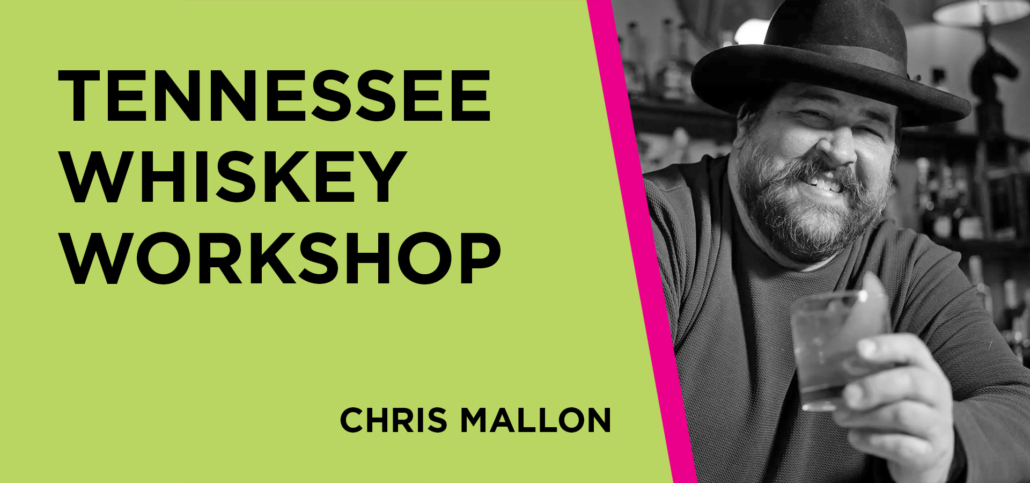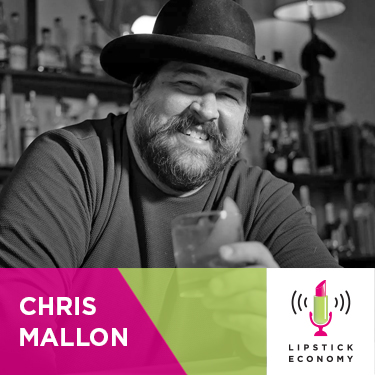Chris Mallon
Tennessee Whiskey Workshop
Chris Mallon is the founder of Tennessee Whiskey Workshop, a top-rated immersive cocktail experience in Nashville. He is a 25-year seasoned hospitality professional. His workshops are designed to immerse you in the captivating world of Tennessee whiskey, where you’ll discover its unique characteristics, learn the time-honored techniques of making the perfect old fashioned, and gain a deeper appreciation for this iconic spirit.
What is the Tennessee Whiskey Workshop? How was the experience, and how did it get started?
During the pandemic, Chris Mallon found inspiration to launch the Tennessee Whiskey Workshop—a hands-on, immersive experience aimed at deepening appreciation for whiskey and empowering people to make better cocktails. Drawing on years of industry experience and a desire to keep learning, Mallon created a space where both locals and visitors could explore the heritage of Tennessee whiskey in a fresh, interactive way.
“The Tennessee Whiskey Workshop is an eye-opening experience for people,” Mallon explains. “It’s about whiskey and its history, but more than that, it’s about giving people the tools to make better drinks. I show them how to engage with Nashville’s whiskey culture, and when they head back home, they can take that knowledge and create better cocktails of their own.”
How did culinary skills help transition into the workshop?
Mallon says his path into the world of whiskey is rooted in his unexpected love for the fast-paced, ever-changing world of the kitchen. Unlike others in the field, he was drawn to the intensity of being a chef—learning to thrive in a hectic environment, mastering the art of balance, and developing a knack for mixing ingredients in creative ways. Those skills, he says, have translated seamlessly into his work at the Tennessee Whiskey Workshop, where he not only teaches others how to craft better drinks but also uses his culinary mindset to solve problems and experiment with new cocktail combinations.
He says, “One thing it did empower me to do that is unforeseen, is I could go and walk into a huge inventory of all kinds of different bottles and I could say, ‘Oh man, why do we have a whole case of this fortified wine of some sort?’ And I would look up really quick the flavor notes of what it tasted like, and then I’d be like, ‘Oh, well I know that works well with blank—whatever it is’—and I would help the bar be able to make a creative, attractive cocktail that was also really intended on moving the inventory that was sitting there. That was a big focus because people get caught up on the creative side, but there’s also the business side of it—the operational side where you need to move that inventory.”
What are some of the most popular flavors, and will everyone be able to easily access the ingredients after the workshop?
One of the most popular creations to come out of the workshop is the Popcorn Old Fashioned—a cocktail that’s become a standout over the years. Chris intentionally designs drinks using ingredients that are accessible to the average home bartender.
“I want the Tennessee Whiskey Workshop to empower people to do this on their own with commonly used ingredients that are really accessible,” he says. “Sure, I could have used rare or unattainable ingredients, but that’s not the point. I want guests to enjoy the workshop while they’re here, and then be able to go home and recreate those same flavors.”
What is one of the biggest misconceptions about people who drink whiskey and bourbon?
According to Chris, one of the biggest misconceptions is that whiskey culture is dominated by cigar-smoking men in suits. That stereotype couldn’t be further from the reality he’s experienced behind the bar.
“A huge misconception in the bourbon and whiskey universe is that it’s a bunch of men in business suits stomping in and ordering some fancy bourbon pour and smoking cigars together or something. And that is not really the case,” he says. “When I started actively bartending, I was surprised to see that the people who came in and ordered over a hundred-dollar pour of bourbon were more likely to be women—often traveling alone, reading something off a tablet or phone, just enjoying a beautiful bourbon and relaxing.”
Who is your target audience, and how did that impact the creation of the logo and the choice of venue?
Mallon set out to create a brand that feels inclusive, approachable, and balanced. He wanted the logo and venue to reflect the welcoming spirit of the workshop—something that would appeal equally to men and women.
“I didn’t want it to be too feminine for men or too masculine for women,” he says. He worked with a designer to capture that tone. “The design she made is approachable. It’s been a great fit because I think it’s not only a great reflection of the workshop, but I kind of feel the same way about the venue I use for most of my public bookings—it’s Jane’s Hideaway. The venue has the same kind of qualities in a sense where it’s approachable, and it’s designed to be for everyone. It’s not too tough or macho. It’s a good balance point of all of that.”
Have women been involved in the whiskey business in Tennessee?
Women have played a vital role in shaping Tennessee’s whiskey legacy—both historically and in the present day. According to historical records, Louisa Nelson, the great-great-great-grandmother of Charlie and Andy Nelson (founders of Nelson’s Green Brier Distillery), is considered the first woman to run a distillery in Tennessee. She was the business mind behind the operation and played a key role in globally distributing Tennessee whiskey at a time when the industry was still running on steam power.
Her legacy continues to inspire modern leaders in the field, including Fawn Weaver, CEO and founder of Uncle Nearest Premium Whiskey, and Victoria Eady Butler, the company’s master blender. Both women are at the forefront of one of the fastest-growing whiskey brands in the country, proving that the influence of women in whiskey is not just part of the past—it’s shaping the future.
How do you use social media to get the word out?
Mallon takes an unconventional approach to social media, focusing less on direct promotion and more on capturing authentic guest experiences. He encourages attendees to document their time at the workshop and share it online, letting organic word-of-mouth do the rest.
“My TikTok and Instagram are more about sharing the guest experience,” he says. “I’ll post pictures of people enjoying the class, and I always encourage people to use their phones. I tell them they can record the whole thing if they want—it doesn’t bother me. And at the end, I ask them to share the videos and tag my Instagram, @tennesseewhiskeyworkshop. So I’m indirectly using social media by encouraging guests to tell the story for me.”
Resources and Links
Website: https://tnwhiskeyworkshop.com
Instagram: @cheezdrinks
Tiktok: @tennesseewhiskeyw




